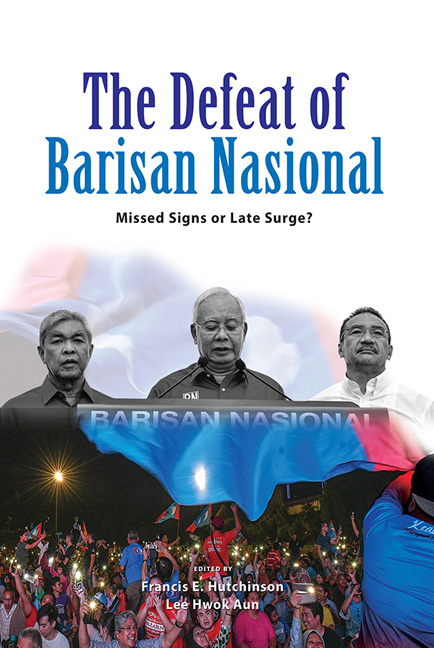10 - Social Transformation and the Consolidation of Chinese Votes for Regime Change
Published online by Cambridge University Press: 17 April 2020
Summary
INTRODUCTION
Chinese support for Pakatan Harapan (PH) not only remained strong in Malaysia's 14th General Elections (GE-14), consistent with voting trends of the 12th and the 13th General Elections, but was also decisive in rejecting Barisan Nasional's (BN) Chinese-based parties of Peninsular Malaysia and East Malaysia. To understand this momentous swing in Chinese support for the former opposition coalition since 2008, we need to look beyond the election issues and campaign strategies of political parties running up to GE-14. This chapter contends that structural shifts in Malaysia's Chinese society—reflected in the profile and influence of civil society organizations and gravitation away from old, predominantly race-based political vehicles—have moved voters in general towards PH, and that allowed for the realignment of elections that took place in 2008 and 2013.
This chapter is comprised of four sections. After this introduction, the second section reviews the general trends of Chinese votes during general elections from 1959 to 2013 with a focus on the gains and losses of Chinese-based political parties in each election and scholarly interpretations of the results. The third section takes a close look at GE-14 by examining the key issues discussed among civil society groups and the campaign issues and strategies adopted mainly by the candidates belonging to the Malaysian Chinese Association (MCA), the Democratic Action Party (DAP) and the Sarawak United People's Party (SUPP). The fourth and final section of the discussion looks at social changes within Malaysia's Chinese society.
TRENDS IN CHINESE VOTES (1959–2013)
1959–69: Flux and Contestation
In the years after Malaysia attained independence, political groupings of the Chinese were largely organized along ethnic and ideological lines and divided into MCA, pro-left parties and the underground Communist Party. The pro-left parties were mainly active in the states of Penang, Selangor and Perak where one finds large and concentrated populations of Chinese people (Lee and Heng 2000, pp. 206–7). DAP came onto the scene only after Singapore's People's Action Party (PAP) was compelled to leave Malaysia in 1965.
The 1950s through the 1960s was a period during which Chinese votes were highly fragmented and distributed among national parties such as MCA, DAP, proleft parties and regional-based parties across the country. The 1969 general election was a watershed event which resulted in the suspension of local elections, banning pro-left parties and enacting several laws that curtailed the freedom of speech.
- Type
- Chapter
- Information
- The Defeat of Barisan NasionalMissed Signs or Late Surge?, pp. 235 - 257Publisher: ISEAS–Yusof Ishak InstitutePrint publication year: 2019



